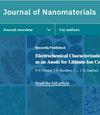基于人工神经网络和自然启发算法的纳米铜合成电沉积过程建模与优化
4区 材料科学
Q2 Materials Science
引用次数: 0
摘要
由于其优异的物理、化学和热性能,制备纳米铜(Cu)越来越受到人们的重视。通过构思自顶向下和自底向上的方法,可以获得多种方法来产生铜纳米粒子。电沉积是一种自下而上、低成本合成高质量铜纳米粒子的方法。铜纳米粒子的性质取决于它们的推导方式和电化学工艺参数。这项工作的目的是推断铜NPs的平均大小。采用人工神经网络(ANN)和自然启发算法,即遗传算法(GA)、萤火虫算法(FA)和布谷鸟搜索算法(CS)对电化学参数进行预测和优化。人工神经网络的预测结果与电沉积过程的数据一致。所有受自然启发的算法都揭示了与最优参数相似的操作条件。当CuSO4浓度为4 g·l−1,电极距离为3 cm,电位差为27 V时,得到的最小NP尺寸为20 nm。合成的NP大小与预期的NP大小一致。利用扫描电子显微镜和x射线衍射仪(XRD)分析了纳米颗粒的大小和形貌。本文章由计算机程序翻译,如有差异,请以英文原文为准。
Modeling and Optimization of Electrodeposition Process for Copper Nanoparticle Synthesis Using ANN and Nature-Inspired Algorithms
Due to its outstanding physical, chemical, and thermal properties, an increasing consideration has been paid to produce copper (Cu) nanoparticles (NPs). Various methods are accessible for producing Cu NPs by conceiving the top–down and bottom–up approaches. Electrodeposition is a bottom–up method to synthesize high-quality Cu NPs at a low cost. The attributes of Cu NPs rely on their way of deduction and electrochemical process parameters. This work aims to deduce the mean size of Cu NPs. Artificial neural networks (ANN) and nature-inspired algorithms, namely genetic algorithm (GA), firefly algorithm (FA), and cuckoo search (CS) algorithm were used to predict and optimize the electrochemical parameters. The results obtained from ANN prediction agreed with data from the electrodeposition process. All nature-inspired algorithms reveal similar operating conditions as optimal parameters. The minimum NP size of 20 nm was obtained for the process parameters of 4 g·l−1 of CuSO4 concentration, electrode distance of 3 cm, and a potential difference of 27 V. The synthesized NP size was in line with the anticipated NP size. The scanning electron microscope and X-ray diffractometer (XRD) were performed to analyze the nanoparticle size and morphology.
求助全文
通过发布文献求助,成功后即可免费获取论文全文。
去求助
来源期刊

Journal of Nanomaterials
工程技术-材料科学:综合
CiteScore
6.10
自引率
0.00%
发文量
577
审稿时长
2.3 months
期刊介绍:
The overall aim of the Journal of Nanomaterials is to bring science and applications together on nanoscale and nanostructured materials with emphasis on synthesis, processing, characterization, and applications of materials containing true nanosize dimensions or nanostructures that enable novel/enhanced properties or functions. It is directed at both academic researchers and practicing engineers. Journal of Nanomaterials will highlight the continued growth and new challenges in nanomaterials science, engineering, and nanotechnology, both for application development and for basic research.
 求助内容:
求助内容: 应助结果提醒方式:
应助结果提醒方式:


